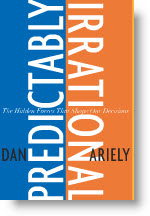 I finally got around to reading this book, and it was worth it. This
I finally got around to reading this book, and it was worth it. This
review has links to videos and related material to help you get more
from the book. Bottom-line: It was fun and easy-to-read … with short
chapters and memorable stories that make practical points.
Magic, Markets and the Mind … A Little Back-Story.
Magic fascinated me when I was younger. I loved learning new and cool illusions. There's something satisfying about seeing behind the curtain, and understanding how it works.
Now, as an adult, I'm struck with how similar that is to my fascination with understanding stock markets and trading techniques. Of course, increased skill in this area is potentially rewarding financially. But there also is something intellectually pleasing about believing you can see and understand what's really happening in the markets.
Taking that a bit further, it's not surprising that people spend so much time and money trying to understand how the mind works. Our brains didn't come with a user's manual; though sometimes it would be useful to have one to help understand why something is happening or
how to get a different result.
Some aspects of my mind that truly amaze me, while other parts of my mind confound me. Have you ever asked yourself: How can someone so smart be so dumb, at the same time? I suspect that most people have.
Obviously that is why there are whole industries that help shine a light into that darkness. Whether it's through personality or temperament testing, learning to use NLP, or finding some other way for us to optimize our performance or understanding … people want insights and answers.
That is why I'm happy to review the book Predictably Irrational. It was interesting and fun; and it provides some insights worth having. Think of it as a few of the missing chapters from our Owner's Manual.
Predictably Irrational: The Hidden Forces That Shape Our Decisions.
When it comes to making decisions in our lives, we think were in
control. We think we're making smart, rational choices. But are we?
In a series of illuminating, often surprising experiments, Professor Dan Ariely refutes the common assumption that we behave in rational ways.
His book, Predictably Irrational: The Hidden Forces That Shape
Our Decisions, contains an interesting mix of psychology and economics, he calls "behavioral
economics". The main point of the book is that while irrational behavior is a
part of human nature, people tend to behave irrationally in a predictable fashion.
Consequently, Ariely suggests that we would be better off if we designed systems to compensate for our limitations. With that in mind, this
book can change the way you interact with the world, one decision at a
time.
Why Smart People Do Dumb Things:
Blending
everyday experience with research, he explains how
expectations, emotions, social norms, and other invisible, seemingly
illogical forces skew our reasoning abilities.
Not only do we make
astonishingly simple mistakes every day, we make these same types
of mistakes, repeatedly.
- We consistently overpay, underestimate, and
procrastinate. - We fail to understand the profound effects of our
emotions on what we want. And - We overvalue what we already own.
Yet
these misguided behaviors are neither random nor senseless. They are
systematic and predictable – thus, making us predictably irrational.
Here is a brief video that explains more about how you can use behavioral economics to combat the Predictably Irrational.
Here is the direct link to Dan's speech to Google at the @Google Talks Series.
The Book Illustrates Some of the Ways We Exercise Bad Judgment in the Economics of Life.
There are a lot of interesting tidbits in this book. For example, the book explains why cautious people make poor decisions when excited, or why
you enjoy the more expensive option over its cheaper counterpart.
One study in the book shows that Cheap is Good; But Free Seems Better. When asked if they’d like a 15-cent Lindt truffle or a one-cent Hershey’s Kiss, 73% of people buy the truffle. However, simply drop a penny off the price of each – so … a 14 cent truffle or a free Hershey’s Kiss – and only 31% choose the Lindt. Is eating the chocolate you don’t really want worth saving a penny? Probably not; but it is human nature.
According to Ariely, we should re-examine and re-cast our understanding of economics to reflect the systematic (and unsurprising) irrationality of human nature. Ariely argues that greater understanding of previously ignored or misunderstood forces (emotions, relativity, and social norms) that influence our economic behavior brings a variety of opportunities to better predict individual motivation and consumer choice, as well as economic and educational policies.
Other Links:
- There is a lot of good content on the Predictably Irrational Blog.
- Wikipedia has a nice summary of "Predictably Irrational" and its findings.
- Here are videos demonstrating the main topic of each book chapter.
Links to Other Speeches:
- Dan Ariely on the Psychology of Money from MIT's Media lab.
- "Predictably Irrational meets the Stock Market" by Dan Ariely.
- Here is a Keynote Address he gave at a Conference. It is interesting and a little different.
By the way, there is a whole @Google Talks Series. It is worth exploring. I especially like the Authors section.
